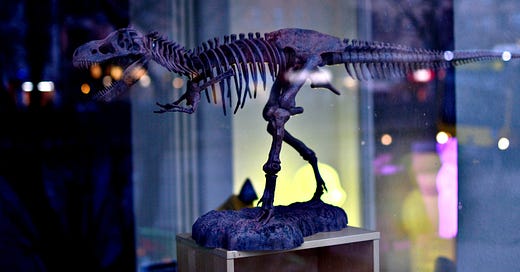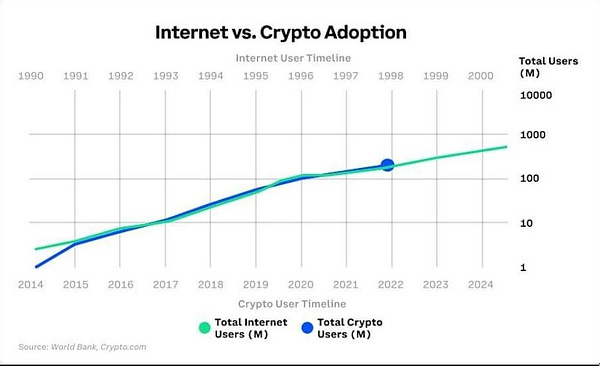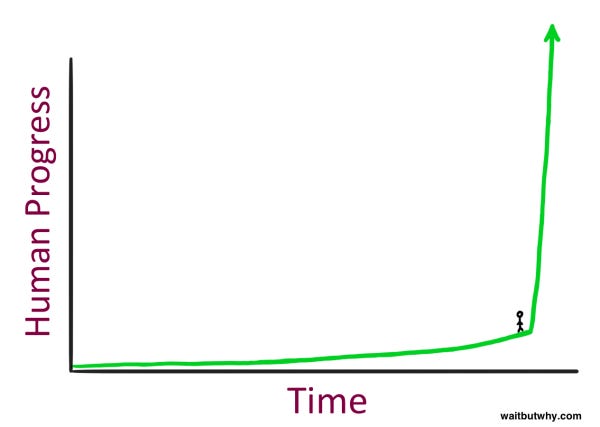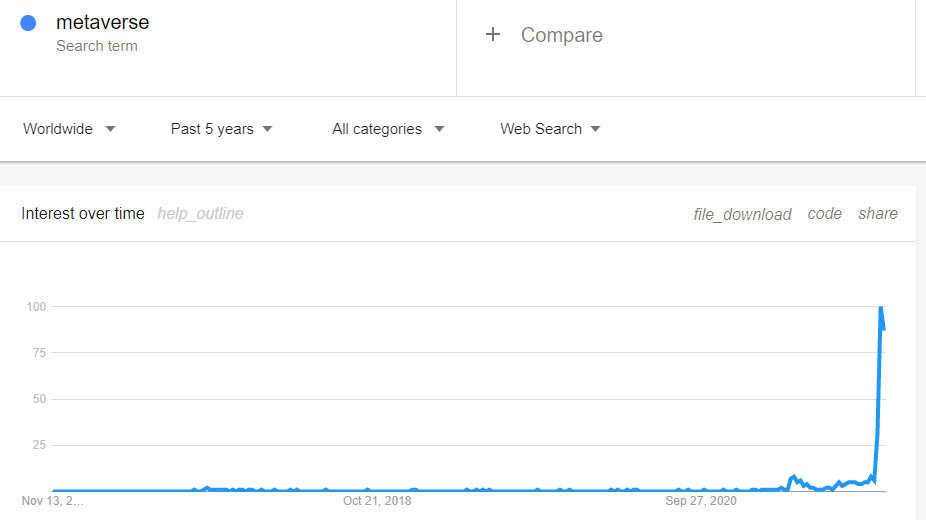👋 Hello to the 619 subscribers receiving today's email and a special welcome to the 30 new readers who joined us in the last two weeks. You thought you were signing up for a newsletter about habits, motivation, careers, and physical & mental health. Well... this week you're actually getting a newsletter about web3, NFTs, and the metaverse. Is this a bait and switch? I hope not but I'll let you be the judge. I don’t know if you share my interest in these topics but I do know that they will absolutely affect your habits, your career, and maybe even your physical and mental health in the years to come. So we all need to get ahead of this—collectively. That's what I'm trying to do with today’s article. So join me for a quick romp through the metaverse. I hope you'll come out on the other side with a bit more insight on how to personally approach the massive technological shifts taking place before our eyes.
💡 The big idea
Back in April, I wrote a piece called Keeping up when everything is getting faster. In that piece, I tried to make sense of the incredible flurry of activity taking place in areas like cryptocurrencies, NFTs, and artificial intelligence (AI). More importantly, I suggested a few strategies for at least trying to keep up—for the sake of our careers and just our general ability to understand what the heck is going on around us.
You can think of today's piece as Part 2, which I believe is warranted just seven months later because the wheel of innovation keeps spinning faster and faster. If you stop paying attention, you risk getting lost. And I'm going to try to convince you that that would not be in your best interest.
First of all, and I've used the graphic below from Tim Urban before, but I think it’s tremendously helpful to think about where we are in the grand scheme of human technological progress.
If the recent innovations in the fields of crypto and NFTs are any indication, things are starting to go… vertical. That means things are about to get crazy. You think the advent of the internet and the almost infinite ways that it’s infiltrated our lives over the last 25 years was wild? Just wait. Life as we know it is about to be transformed. I really do believe this.
Let's talk about two (related) developments at the forefront of this innovation:
Crypto, web3, and NFTs have continued to explode in popularity
The metaverse has officially entered the collective cultural vocabulary, with a big boost from the artist formerly known as Facebook
Let me explain why I think you need to pay attention to these.
Crypto, web3, & NFTs
Simply put, ignoring crypto, web3, and NFTs today is akin to ignoring the internet and mobile phones in 1995 or 2000. Just like the internet—this is happening. And it's going to happen with or without you. We've moved well past the stage of "this might be a fad" and "Why would someone pay millions of dollars to own a JPEG?" to the realization that the underlying technology and businesses being built in this area today are likely to legitimately upend virtually every industry we know of and create many that we haven’t even yet conceived—not dissimilar to the impact of the internet itself.
"But I don't even know what web3 is," you might think. Well, you didn't know what the internet was 25 years ago either, but you learned quickly and now you can’t live without it.
At the simplest level, here’s what you need to know about web3:
It is the next iteration of the internet. And it allows the internet to be a) owned by its users and b) decentralized.
On today’s internet (web2), large companies like Google, Facebook, Twitter, Spotify, and others have essentially monopolized the economic profits—while the users get very little or nothing. The platforms are the winners.
On web3, many of the applications may ultimately look the same—social media feeds, streaming music services, etc.—but the incentive structures will differ. This will be enabled by blockchain technology, which allows value to be transferred from one party to another in a “trustless” way—meaning you and I don’t need to trust each other or even know each other’s identities to do business together.
What’s great about web3 is that for the first time the internet will become “ownable” by its users. This is where NFTs and cryptocurrencies come in. NFTs, as I wrote here, are essentially unique digital assets, and cryptocurrencies are a means of value storage and transfer in this new digital world.
What NFTs, cryptocurrencies, and blockchain technology do is open up an almost infinite number of opportunities to create, store and transfer economic value in a way that was never available before—completely decentralized and “trustless,” including:
The ability for creators of all types (writers, musicians, podcasters, etc.) to monetize their efforts directly and without the need for middlemen
The ability to support causes and people you care about; to “bet” early on people you think are going to be successful; and/or to fund projects that otherwise may not have gotten off the ground
The ability for the users (or fans) of any service or platform to own an economic stake in the future success of that service or platform
The world is waking up to these possibilities. Here is New York City’s newly elected mayor:



This is not just about speculating on cryptocurrencies or digital kitties—although that’s part of it. Just like in the late-90s, speculative bubbles are inflating and will likely pop. But just like with the internet, the technology is here to stay and we’re only just beginning to understand how it might be used. There’s a reason why many of the smartest people in tech are quitting their jobs at Google, Facebook, and Apple to join crypto start-ups. It’s because the pace of innovation is breakneck and many, many fortunes will be made (and probably lost) over the next decade.
We all need to understand the basics of what’s happening here. I’ve got lots of sources to recommend where you can learn more (several are at the bottom of this article) but do me a favor and listen to this podcast with Tim Ferriss, Naval Ravikant and Chris Dixon. These three might be better than anyone in the world at explaining these concepts and how they may start to impact your world.
And speaking of worlds…
The metaverse
Metaverse is a term that was first coined by author Neal Stephenson in his 1992 novel, Snowcrash, which depicted a virtual world where humans interacted with each other as avatars. More recently, the idea of humans living much of their lives in virtual worlds was depicted in the book, Ready Player One (and the movie, too, but the book was much better). Now, the concept is again having its moment as seen in the explosive take-off in Google searches for the term.
This most recent boost in popularity comes mostly care of Mark Zuckerberg who recently renamed Facebook to "Meta" and explained his vision in the (somewhat creepy and dystopian) 1-hour video below about how the future of his company (and maybe all of our worlds) is, in fact, in the metaverse.
It’s not just Facebook (I mean, Meta). Microsoft, too, has been touting their own vision of the metaverse. And the concept of virtual worlds is arguably furthest along in the gaming space, where Roblox and others have been operating increasingly sophisticated virtual worlds for years.
The (real?) world is now catching on. And expectations are growing.




You might think "I'm not interested in living in a digital world. I'll take the physical world, thank you very much." And I would understand. I love the physical world. Trees, and beaches, and golf courses. It's awesome.
But guess what? You've already lost this battle. How much screen time does your iPhone tell you that you have per day? 2, 3, 4 hours? During that time, your body is in the physical world but your attention certainly isn't. That's basically the metaverse. We just never had a widely accepted name for it before. Add in the time you spend on Zoom, Netflix, and social media, and… sorry, friend… but you’re already there.
In fact, the shift to the metaverse may end up being less of a sudden ‘virtual reality’ revolution and more of a subtle ‘augmented reality’ evolution as it seeps into our daily lives all but unnoticed.
The specifics of how this plays out are anyone’s guess. Venture capitalist, Josh Wolfe thinks a bunch of teenagers are likely to be the ones to bring it into existence (versus Zuck and his billions of dollars).



What we do know is this: The innovation in these technologies is accelerating at lightning speeds and whether it’s crypto, NFTs, or the metaverse, these innovations will begin to impact all of our lives in very material ways in the very near future.
So what can we do about it?
Educate ourselves — I’ve written before about information diets and there’s a very specific reason why I include a Content Diet section at the bottom of every newsletter. The world is awash with information and it’s all vying for your attention. Your future success in any endeavor—from your career to your health—is very likely to be a function of the information you let in. The good news is that you can educate yourself on everything discussed in this newsletter for free. And trust me, consuming this content is much more rewarding than doom-scrolling Facebook or TikTok, or torturing yourself with cable news. Some of my favorite resources are below.
Protect ourselves — Maybe I’m an optimist, but I personally believe that the lion’s share of the innovations discussed here will make our lives better in many ways. But certainly as our worlds become more digital, there are risks. There are risks of scams and bad actors and there is the very real risk of digital addiction. With a (maybe not-so-mild) addiction to Twitter myself, I might not be the best to opine on this, but I think the answer is related to what I wrote about two weeks ago: setting non-negotiable rules for ourselves with how we interact with technology.
Ultimately, what’s happening in technology today might just usher in one of the greatest periods ever in human progress. But the networked nature of our existence today means that it’s going to move faster than any of us can even comprehend. So try to keep up—your future self might just thank you for it.
That’s it for this week. But I have a few parting gifts for you…
Photo credit: https://unsplash.com/@emilianovittoriosi
🎙 📚 Content Diet
🎙 Eric Schmidt & Tim Ferriss — Half of today’s newsletter was supposed to be about Artificial Intelligence but I ran out of room! By oh my God, listen to this conversation w/ Google’s former CEO for a mindblowing update on where AI is today and where it’s going. Talk about tech that is going to change our lives from healthcare to warfare, this is a must listen.
Some of my favorite crypto/web3/NFT resources
The ‘Hash’ series from Patrick O’Shaughnessy’s Invest Like the Best podcast. These episodes are a few years old but still one of the best primers out there.
The ‘Crypto for Institutions’ series from Ted Seide’s Capital Allocators podcast.
Loads of Tim Ferriss episodes including any that feature Naval Ravikant, Chris Dixon, Jesse Walden or Balaji Srinivasan
Packy McCormick’s Not Boring newsletter (once you graduate from the pods, come here for the ‘201’ content).
That should be enough to be dangerous.
📬 Mailbag
And now for something completely different…. I wanted to follow up on the last Intentional Wisdom newsletter titled Rules > Willpower. I received some incredible reader responses to that one and Chris Cornell and Danny Miranda were kind enough to share it to their own (quite sizable) audiences. Thanks, guys! One interaction, in particular, with reader Fred Bartholomai on some of the rules he’s implemented for his diet got my wheels turning and I wanted to share it with you (with permission & slightly edited down):
On Thu, Oct 28, 2021 at 11:19 AM Fred Bartholomai wrote:
Greg,
Just read your article on the "cycle of failed habits". Totally agree. It has happened to me as well.
What has changed to help me stay the course is a few things:
I reframed my view - I can't keep up or don't want to keep up with what other people are doing
I have to focus on what works for "me". Yes, I am very open to what others are saying and I am influenced by them. But, in terms of "my" schedule - the key is what is "sustainable" for me -- This has made all the difference - I got tired of failing.
2nd big change - having a support group - In terms of low carb - I am daily on youtube following my two favorite low carb Docs - Dr Ken Berry and Dr Boz. They walk the walk, they practice what they preach. They help me stay the course.
And yes - rules - are key - more so than willpower (Although I think some willpower is needed, in small doses, at critical points); "lines in the sand" as you say - That is key. What is non-negotiable? - I call it Bright Lines.
Is it hard in the beginning? Yes, definitely. Which I think is why most people don't do this - or fail. They keep crossing the lines they set for themselves. Which I did for so many years. What you talk about in your article.
I think it was also getting to some type of "bottom" point - Getting sick and tired of being sick and tired! I set up my bright lines regarding Diet - Low Carb/Keto - on 12/15/18 - That was the day I hit a point where I couldn't continue doing what I had been doing. I had to change.
"What got me here won't get me where I want to go .. thinking of my future self."
That was the day I really decided to make it stick.
Every day for low carb/fasting lifestyle - it gets just a little easier. I call it the 1% rule.
You get a little stronger every day in these behavior type changes (which is very hard!!!!!)
The habits stick a little more,
These days I follow Chris Cornell and Jocko and Tim Ferris as well. I totally agree with the quote from Tim Ferris - It has made all the difference in the world.
I think for many years I chafed and resisted setting these kinds of rules. That I would be stifling my creativity and freedom! But, I have learned since then - it does nothing to stifle my creativity and nothing to stifle my freedom.
It has given me more of both. And that lesson that took 55 years to learn! Arg!
Hope you read this. Love your article - I think you are spot on.
Regards,
Fred Bartholomai
On Thu, Oct 28, 2021 at 11:40 AM Greg Campion wrote:
I love this email, Fred. Thank you for sharing your experience.
I need to check out Dr Ken Berry and Dr Boz.
You are so spot on in all the points you make. And I like your “bright lines” terminology. I might have to steal that.
I am looking for some very specific guidelines as it relates to diet. I think Chris Cornell’s are probably a good place to start but if you’ve come across any others that make it simple (if not easy) to follow, I’d love to see those. Feel like I am ready to implement something specific right now.
Thanks for reading and for your thoughtful response.
Greg
On Thu, Oct 28, 2021 at 12:10 PM Fred Bartholomai wrote:
Greg,
Ok, you asked for it. My rules of the road regarding diet/lifestyle:
Mon-Fri - more strict.
Daily - OMAD (One meal a day) - I am working towards 20:4 (20 hrs daily fast - 4 hr eat window)
You have to graduate to this. Can't do this day one. Look for Dr Boz talk about "Keto Continuum" (i.e. stages). Start at 16:8, then 18:6, then 20:4 [See Keto Continuum]
Stop eating by 8pm.
My 4 hour window is typically around 4pm-8pm. I may shift the window as my schedule/family life dictates
No snacking - OMAD is what it means - One meal a day in a 4 hour window.
Less than 20 grams (total carbs, not net carbs) per day (I am leaning towards Carnivore - See Dr Ken Berry) [proper human diet]
I avoid added sugar, seed oils and grains (Like Chris Cornell)
I do a weekly 3 Day Water (only) fast [68-72 hours] (coffee/tea - Ok) Usually Tues-Thurs. [inspired by Dr Boz who does this as well]
Avoid dessert during the week [I am not perfect on this. Love my 2G Yogurt [Are you familiar with 2G Yogurt?]
I am really trying to 'kill' my former sugar habit - I am/was a sugar addict!
2. Weekends - Less strict. Need a little bit of a release valve. But still fairly low carb.
May do 2 meals per day. [late lunch, dinner]; May do some light snacking
I may cheat a little, as per the above, But I maintain Low Carb - May go up to 40-50 grams carbs.
If I go nuts in carbs it may be for a birthday party, wedding, some special event - then I will gladly partake in cake, ice cream, bread, etc - With no regrets. I enjoy it. I don't beat myself up [anymore]. I am at the point now, where the next day [need a little will power and practice] I won't relapse and go back to low carb [it is a process]
I have found over time, that I can stray, if you call it that, but then comes Monday - I am back on course. [That return to course on Monday is a big bright line. All about setting boundaries]
That discipline and resolve has strengthened over time.
This is where I am today. But, not where I started 3 years ago. I have built up to this.
Hope this helps. These rules have evolved over time.
Greg - I hear you.
Depends on your goals - I am at my weight - I am shooting for strengthening my metabolism, longevity, strengthening my immune system, brain clarity, physical energy and endurance.
I have found fasting to be key for me [ for this and when I was losing weight]. I would start with some rules - that fit where you are right now.
That will push you a little, AND that are sustainable (for you) on a weekly/daily basis.
What some might call "stretchingly realistic". Draw that line in the sand (bright line) - for you - Go for it!! As some will say "What are you waiting for?" There is AND will never be a perfect time to start!
Cheers,
Fred B.
P.S. I am here if you want to continue this dialog.
This is why I love writing this newsletter. For interactions like this. So much great stuff to take away here—and super-impressive to see what Fred has established for himself. This gives me some great ideas to implement myself - including the idea of establishing rules that have wiggle room (like going easier on the weekends); those definitely seem more sustainable.
Alright, I’ve taken up enough of your time. Thanks for reading.
Have a great week. — Greg











